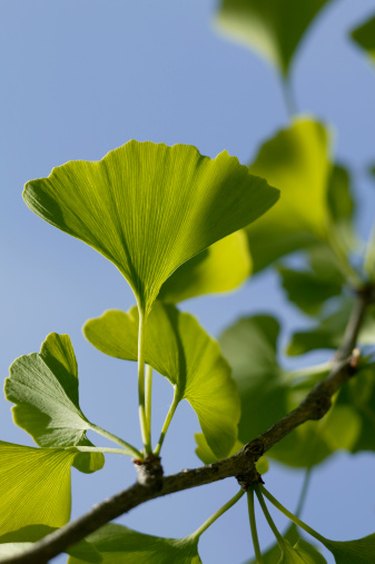Things You'll Need
Dried ginkgo leaves
Scales
Blender
100 proof vodka
Measuring cup
Large-mouthed glass jar
Colander
Cheesecloth
Bowl
Coffee filter
Amber glass storage jar/glass dropper
Label
Marker

Ginkgo biloba is a Chinese plant widely used for treating memory loss as well as circulatory problems and tinnitus and dizziness. Ginkgo leaves are processed into an extract or tincture, where the active components -- notably flavinoids -- are transferred to a long-lasting medium such as 100-proof alcohol and used as a daily health supplement. Leaves picked in late summer and early fall have the highest concentrate of active compounds and you can process dried ginkgo leaves to make your own herbal extract. The most common and safest extracts for making at home use a one-to-eight ratio of dried herb to liquid.
Step 1
Weigh 50 grams of dried ginkgo leaves using accurate kitchen scales and place them in a blender.
Video of the Day
Step 2
Measure 400 ml of 100-proof vodka using a measuring cup and place it in the blender with the dried gingko leaves. Blend until well combined and the leaves are small particles.
Step 3
Pour the blended leaves and vodka into a sterilized large-mouthed jar and close tightly. Leave in a cool, dark place for a minimum of two weeks and up to six weeks, shaking the jar daily.
Step 4
Line a colander with cheesecloth and place both on top of a bowl. Strain the gingko leaves through the cheesecloth, removing as much liquid as possible. Strain the liquid once more through a coffee filter to ensure all the leaf particles are removed.
Step 5
Fill an amber glass jar, or several glass dropper jars, with the processed ginkgo leaves, and label the jars with the name and date the extraction was made, as well as that it is a one-to-eight ratio extraction.
Tip
Neat cider vinegar can replace alcohol at a one-to-five ratio of herb to vinegar, but the extract will be less potent.
Warning
Ginkgo has few side effects, and though they are rarely felt, in some cases nausea and headache can present from taking the extract. Take with food for best results, and always consult a qualified medical practitioner or herbalist before beginning treatment with any herbal extract and desist use if side effects present.
Video of the Day